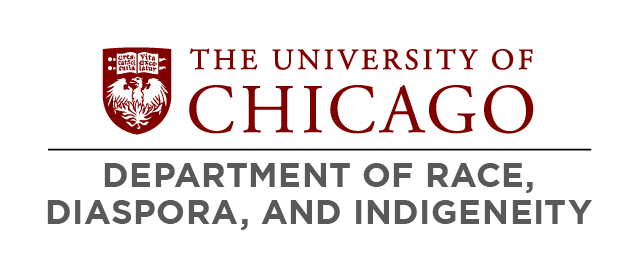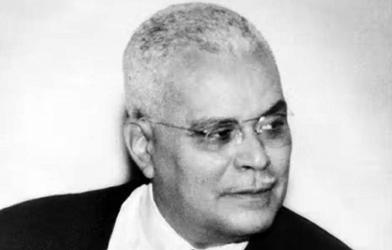Honoring Professor W. Allison Davis in an inaugural symposium
“This is a moment for us to step back and really celebrate the brilliance and the incredible accomplishments of Professor Davis.”
By Sarah Steimer
There are scholars whose work has changed the course of their field of study, and others still whose work changes the course of history. In one shining example of both, the Department of Race, Diaspora, and Indigeneity, and the Division of the Social Sciences will highlight the work of Professor W. Allison Davis, PhD’42 (1902-1983), a scholar who affected the trajectory of scholarship at the university and impacted Black Americans’ lives, on Thursday, April 25, and Friday April 26.
“This is a moment for us to step back and really celebrate the brilliance and the incredible accomplishments of Professor Davis,” says Cathy Cohen, the David and Mary Winton Green Distinguished Service Professor of Political Science and co-chair of the planning committee. “He had a substantive impact both in the academy and outside of the academy. But his life and his trajectory also allows us to really interrogate the impact of race and racism in shaping the work of the academy, both during his time and today.”
Professor Davis was trained in the methodologies of the Chicago School of Sociology and Social Anthropology, and was the first Black tenured faculty member at a predominantly white university. The sheer fact of this difference meant his research was never just about academic fact-finding, and he spent his life innovating new applications of social science to challenge racial inequality in America. His 1941 book, Deep South, provided critical support for the NAACP Legal Defense Fund’s efforts in the Brown vs. Board of Education case. And across his long career, Davis called out bias in the methods that social scientists adopt in the study of life success and educational achievement.
“What did it mean to be a black scholar at the University of Chicago in the 1940s?” Cohen asks — a question to be further explored at the symposium. “What did it mean to struggle to be seen and heard and to make those contributions? There's a story about the ways in which he was hired, but was sent a memo saying ‘We can't ensure your happiness or social integration.’ His relationship to the University of Chicago was a complicated one, and we want to explore that also.”
This is a question, too, that can be asked in the opposite direction: What did it mean for the university to be home to one of the first Black tenured professors at a white-dominated school?
“The importance, his importance, from the standpoint of the academy is not only that in terms of the way in which we view him at the University of Chicago, but very much in terms of demonstrating a way in which the university has historically led the professoriate across the nation in terms of its diversity,” says fellow symposium co-chair Waldo E. Johnson, Jr., the Vice Provost for Diversity and Inclusion and Professor in the Crown Family School of Social Work, Policy, and Practice,
As part of the event, Cohen will chair a panel at the event called “Race and the Academy,” which will also feature Professors Margaret Beale Spencer, Waldo Johnson, and Gina Samuels. According to Cohen, each panelist — like Davis — has made deep contributions to the academy, but also can speak to the difficulties that they've encountered because of their position as Black people and their insistence on studying and centering Black people in their work.
Johnson emphasizes that Davis’s legacy underscores the wide-ranging and ongoing impact of diversity in the academy.
“Particularly at this moment, where there are a lot of calls in a wide range of spaces across the country about the importance or the utility of having a diverse campus — in terms of professors, of students, and staff — this is extremely important,” Johnson says. “His is not a name that readily comes to mind, even among the African American or other scholars of color in the way that we might think about a John Hope Franklin or a W.E.B. DuBois. So for people to recognize who he was, and the fact that he was doing this work in the first half of the 20th century, and doing this work as a faculty member at the University of Chicago is important.”
Other panels during the event include the recipients of the Allison Davis Graduate Research Award, as well as a panel titled “Education and Race.” This latter conversation will feature Barbara Bowman, founder and past president of the Erikson Institute, former director of Early Childhood Education for Chicago Public Schools, and a long-time friend of Allison Davis; Mary Pattillo, the Harold Washington Professor and Chair of Sociology at Northwestern University and prominent expert on urban neighborhoods; and Onnie Rogers, an expert on cultural stereotypes, identity formation, and educational inequities currently working as an associate professor of psychology at Northwestern University and who will join UChicago as an associate professor of Comparative Human Development.
“I think it will be important for people who come to the symposium to see how work that is thought to be academic has a life and impact outside the academy,” Cohen says. “We know this through the way in which he influenced or supported the Brown v, Board decision, the way his work helped facilitate the start of the federal Head Start program, and the way his work led to many school districts rejecting intelligence tests. Here we have a scholar whose work was meaningful both to other scholars, but also meaningful to the shape of policy outside the academy.”
An endowed fund to sustain the symposium in perpetuity was established with the leadership support of a University of Chicago Trustee and two Trustees Emeriti, among several donors. The goal of the event and all following symposiums is to shed light on Professor Davis’s lifelong commitment to studying the causes and consequences of racial and social inequality, while also honoring his legacy by focusing attention on the work that still lies ahead.
The agenda for the symposium is available here. The events are free and open to the public; an RSVP is requested here.
 THE UNIVERSITY OF CHICAGO
THE UNIVERSITY OF CHICAGO


